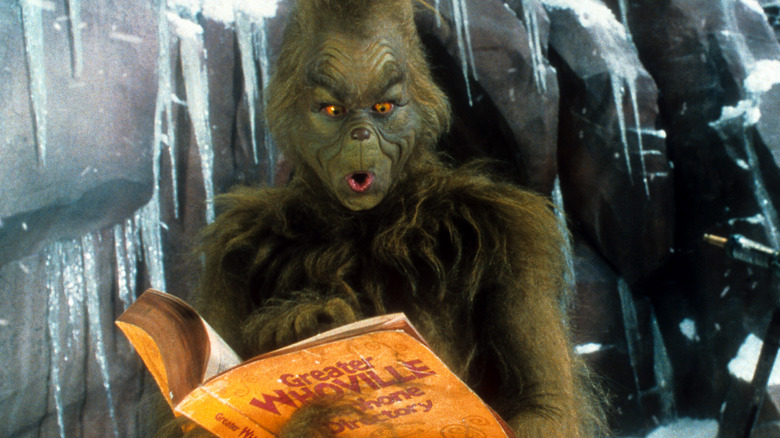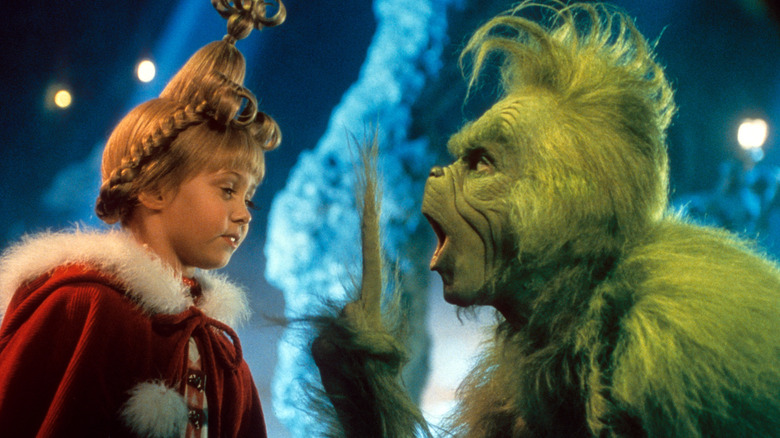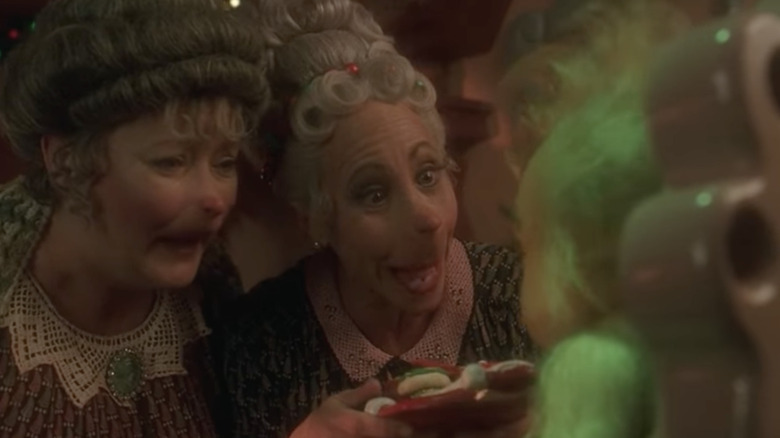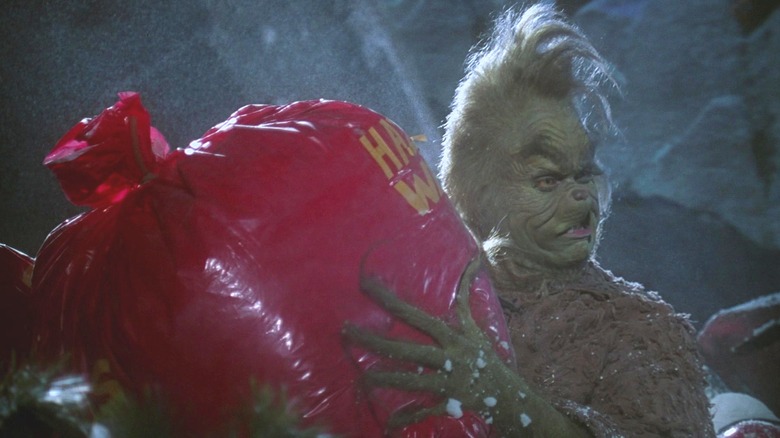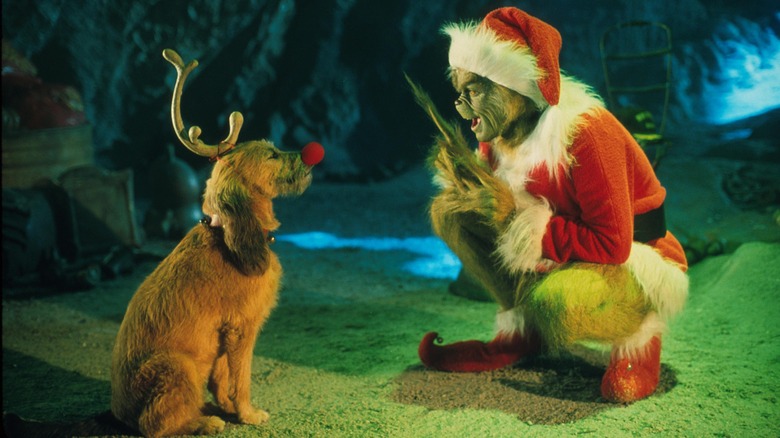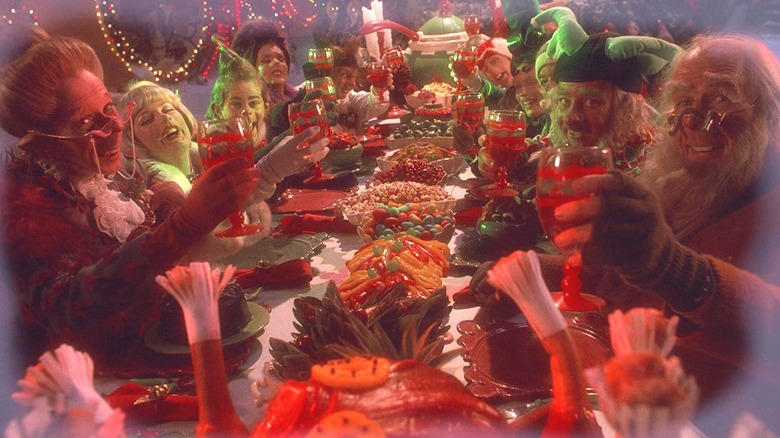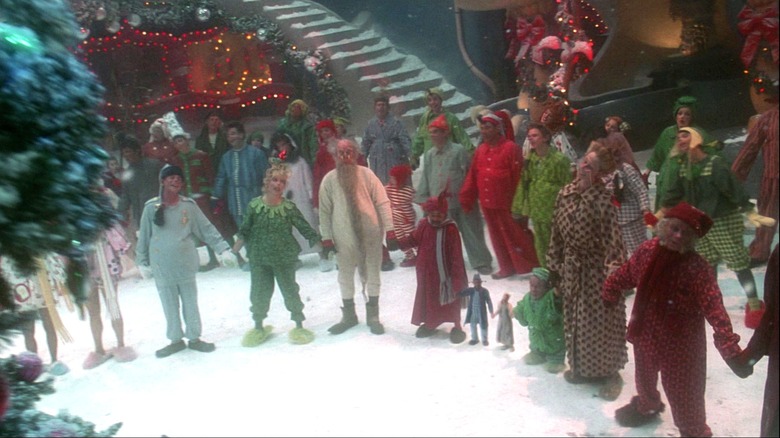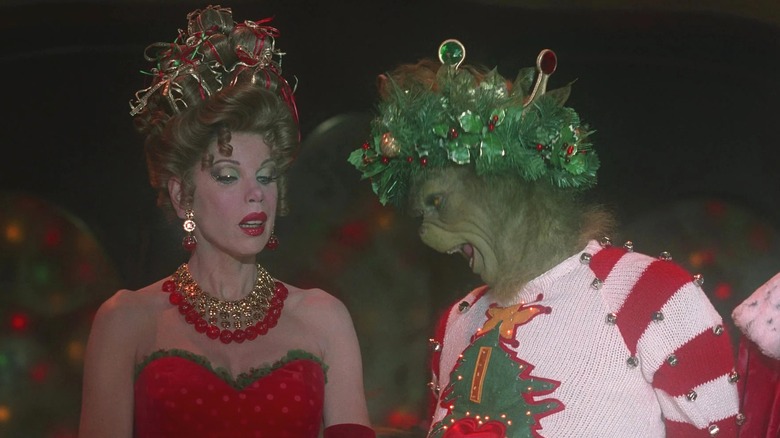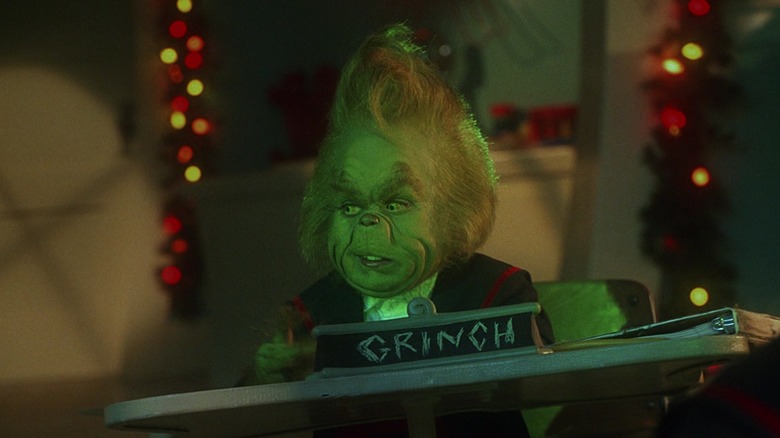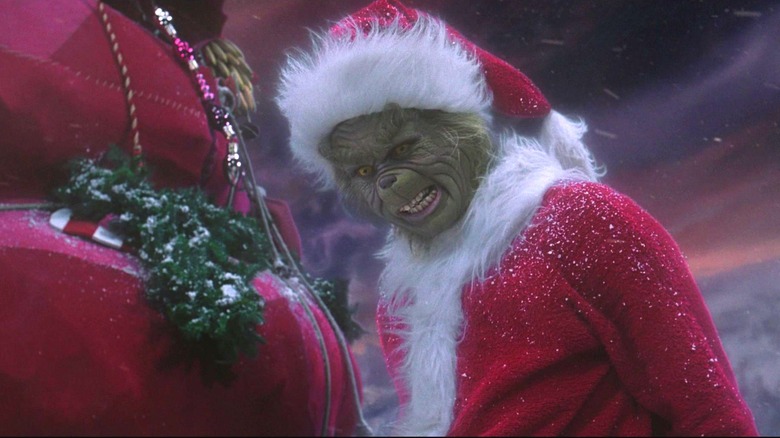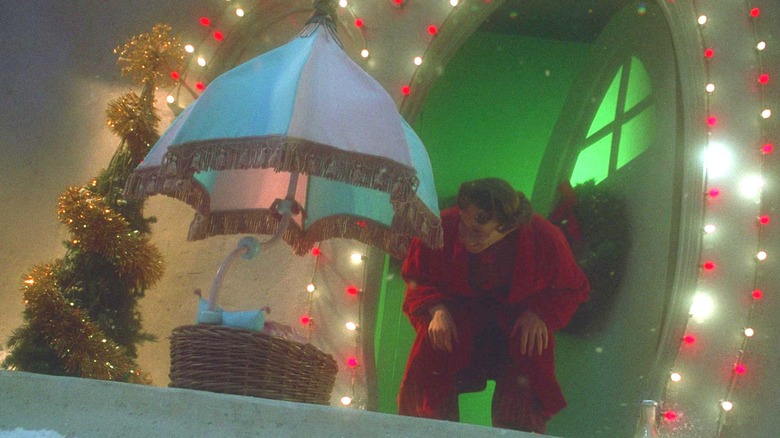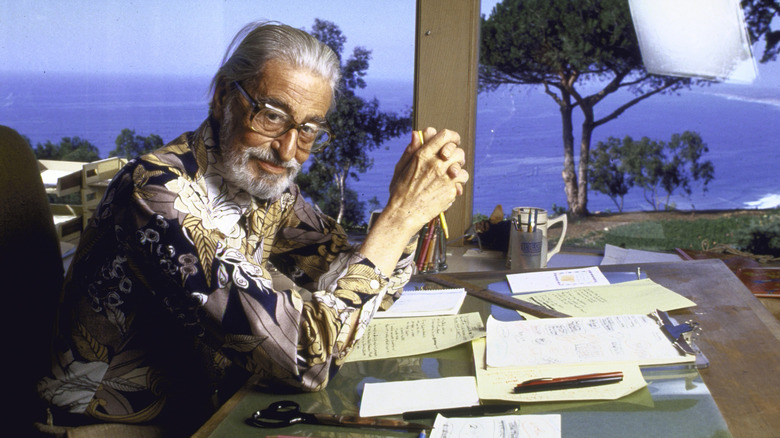What Only Adults Notice About How The Grinch Stole Christmas
Unless you've been living on a snowflake, you're probably familiar with the 2000 film adaptation of Dr. Seuss' "How the Grinch Stole Christmas." Based on the 1957 children's book, it tells the classic story of a malevolent green hairball who finds redemption by discovering the true meaning of Christmas. "The Grinch" movie features an all-star cast, a whimsical set design, and an unforgettable performance by Jim Carrey as the Grinch. It emerged as an instant classic — and today, it remains one of the most popular Christmas movies of all time. Like the annual Who feast, this holiday blockbuster comes back year after year — and somehow, it keeps getting better.
"How the Grinch Stole Christmas" truly is a romp for all ages. In fact, "Grinch" director Ron Howard took great care to include themes for kids and adults alike. "One of the guiding principles for me was to try to create for adults some images that they'd relate to," Howard told Empire in 2001. Not only does the film feature some relatable images — it also contains a few crude, scandalous, and downright NSFW moments. These adult-themed details are so subtle that younger audiences would likely never notice them — but as adults, we'll never look at "The Grinch" the same way again.
Cindy Lou Who is alarmingly unsupervised
The Grinch isn't the only main character in "How the Grinch Stole Christmas." The film also centers on Cindy Lou Who (Taylor Momsen), a precocious youngster who is grappling with her own Yuletide gloom. In the end, Cindy Lou saves the day by befriending the Grinch and restoring the Christmas spirit to Whoville. However, adult viewers might be understandably concerned about Cindy Lou's safety, given that she's rarely in the care of a grown-up.
Throughout the film, Cindy Lou is ignored and dismissed by the adults in her life. For example, there's the scene where Cindy Lou first meets the Grinch at the post office. Her father, Lou Lou Who, leaves her unattended, where she falls into a mail-sorting machine and is nearly squashed by a giant mechanical stamp. The Grinch reluctantly rescues the child before gift-wrapping her. When Lou returns to find his daughter wrapped up like a Yuletide mummy, he's more amused than concerned. Then, he dismisses Cindy Lou when she tries to tell him about her Grinch encounter.
And don't even get us started on the scene where Cindy Lou sneaks away to visit the Grinch on Mount Crumpit. What were Cindy Lou's parents so preoccupied with that she was able to climb a mountain, enter a stranger's house, and slide down a giant trash chute, all in a single afternoon? Somebody get this child some adult supervision!
The Grinch's adoptive moms are swingers
The juiciest piece of "Grinch" cannon occurs during a flashback to the Grinch's origin story. The scene starts off innocently enough, with Baby Grinch arriving in Whoville via a flying bassinet. When the wind knocks him off course, he lands on the doorstep of his future adoptive mothers. The camera pans through the window, where a festive party scene is underway. The Grinch's moms refer to the shindig as their "annual holiday get-together." However, savvy viewers have noticed a subtle yet utterly salacious detail about the scene. For a brief moment, we see the party guests tossing their keys into a glass jar — indicating that the holiday gathering was, in fact, a swinger party.
For those out of the loop, the term "swingers" generally refers to couples who take part in sexual acts with other couples, individuals, or groups. Key parties — like the one depicted in "The Grinch" — are a popular staple within the swinger community. At these gatherings, everyone places their keys in a jar. Throughout the night, guests randomly select a key from the jar, and whichever key they pick determines who they go home with.
Fortunately, this scandalous little detail is sure to fly over the heads of young audiences — but as adult viewers, we can all give props to the Grinch's moms for truly living their best lives.
The residents of Whoville aren't environmentally conscious
As an adult viewer, you might be disturbed by Whoville's approach to waste management in "How the Grinch Stole Christmas." For one thing, all of their trash gets tossed into a giant chute, where it gets sucked up to the top of Mount Crumpit. Forget figuring out why the Grinch hated Christmas — we want to know why the Whos have turned this beautiful mountain into a dumping ground. We understand that Whoville is a small town, but is it really too small for a proper waste management facility?
Not only do the Whos snub their noses at proper garbage disposal, but they're also excessively wasteful. As the Grinch points out, the townspeople even throw away most of their Christmas presents. "You wanna know what happens to your gifts?" the Grinch sneers during a scathing monologue to the Whos. "They all come to me ... in your garbage. You see what I'm saying? In your garbage." In addition to their wastefulness, the Whos use loads of electricity to power their Christmas light displays. Frankly, we shudder to think about Whoville's carbon footprint.
Whoville's environmental negligence was a solid narrative choice for "The Grinch" because it gels with the anti-consumerist tone of the story. Ironically, "Grinch" creator Theodor Seuss Geisel, aka Dr. Seuss, was a staunch environmentalist who sometimes wrote about the topic. Even Dr. Seuss himself would disapprove of Whoville's wasteful habits.
The Grinch has symptoms of depression
These days, the term "Grinch" is so widely known that it has earned a spot in the dictionary. Merriam-Webster defines the word as: "a grumpy person who spoils the pleasure of others." But, digging into the Grinch's behavior, it's worth noting that his perpetual grouchiness could be a sign of something deeper. As an adult viewer, you might notice that the Grinch has depression symptoms.
According to psychologist Cynthia Bulik, depression has a broad range of symptoms, and some are less obvious than others. "When people think about depression, they often think about people being sad," Bulik told CBC. "But that's not always how depression expresses itself. Sometimes people who are depressed might get really irritable, and really grumpy and they can really withdraw socially."
But it's not just the Grinch's cranky, misanthropic attitude that indicates possible depression symptoms. Some of his other behaviors — like emotional eating, mood swings, and low self-esteem — are just as concerning. As Bulik pointed out, the Grinch's emotional state might be related to his complicated feelings about Christmas. The mental health expert stated: "When we don't have those feelings inside ourselves, being around people that are happy, and excited and feeling very social is really difficult and painful because you don't feel you can contribute to any of the conversations in the room."
There's hardly any diversity
Whoville may be a small town, but it has no shortage of hustle and bustle. Remember all of those shots featuring large crowds of Whos? Well, those scenes were actually created with the help of CGI. To save time on hair and makeup — a process that took several hours for each actor — the crew made hundreds of computer-generated Whos and spliced them into various crowd scenes.
With the ability to create a small army of digital Whos, you might expect the makers of "The Grinch" to opt for more diversity. Unfortunately, you'd be wrong. The film features very few characters of color — it also lacks any visibly queer characters or nontraditional families. If you're wondering, "Does race even exist in Whoville?" the answer is yes. In one scene, a taxi refuses to stop for the Grinch, and he shouts, "It's because I'm green, isn't it?" Granted, this is a cringeworthy line because it pokes fun at racial discrimination — however, it does suggest that the characters are aware of race.
Of course, lack of diversity isn't an issue that's unique to "How the Grinch Stole Christmas." In a 2021 survey by ViacomCBS, 84% of respondents said they wanted to see more diversity in movies and television (via Paramount). In the 2018 animated adaptation of "The Grinch," producers tackled the issue of representation by creating a multicultural version of Whoville — they also featured Cindy Lou Who being raised by a single parent.
The lyrics to Welcome Christmas are just gibberish
It's true that nobody can fashion made-up words quite like Theodor Seuss Geisel (Dr. Seuss). In his books, the children's author used nonsense terminology like "zong," "obst," and "lerkim" to enhance his rhymes. Some Seuss-isms are so popular that they've become part of the cultural zeitgeist. In fact, Dr. Seuss is credited with coining the term "nerd." That said, it's no surprise that "How the Grinch Stole Christmas" features some iconic Seussian gibberish.
In 1966, Dr. Seuss teamed up with animation legend Chuck Jones to create a TV special based on "How the Grinch Stole Christmas." The pair made several adjustments to the original story — including the Grinch's famous green hue (he was previously white in the book). They also added a soundtrack featuring songs written by Dr. Seuss. One of the songs was "Welcome Christmas," which contains timeless lyrics like "Fahoo Fores, Dahoo Dores" and "Welcome, welcome fahoo ramus." But what exactly do those words mean? The answer: absolutely nothing. However, the public didn't seem to mind Dr. Seuss' ad-libbing — in fact, actor Boris Karloff even won a Grammy for his work on the television special. Not too shabby for a load of gibberish.
Keeping with tradition, "Welcome Christmas" appeared in the 2000 "Grinch" adaptation. The contemporary version was produced by James Horner, who scored numerous other blockbusters, including "Braveheart" and "Titanic."
Martha May Whovier is objectified
In Whoville, Martha May Whovier (Christine Baranski) is the ultimate "it" girl. From her iconic fashion sense to her genius decorating skills, there's so much to adore about this character. Unfortunately, the movie condemns Martha May to the status of a sex symbol rather than giving her the depth and complexity she deserves. Young audiences may not notice the objectification of Martha May — but as adults, we can't unsee it.
For one thing, the character oscillates between two tropes: sex symbol and damsel-in-distress. One minute, Martha May is ogling the Grinch or breathily raving about his muscles — the next, she's suffering from a theatrical fainting spell. She's constantly putting up with red-flag behaviors from the male characters, like when Augustus May Who tries to bribe her into marrying him. Plus, who can forget the scene where the Grinch comes rocketing out of the trash chute and lands face-first in her cleavage? The Grinch and Augustus May Who aggressively pursue Martha May, but neither man shows concern for what she actually wants.
In the end, Martha May ends up with the Grinch — and while she seems happy with her choice, she still deserves a better storyline. Can we get a spin-off starring Martha May? Or at least a hair tutorial?
How the Grinch Stole Christmas makes an awkward statement about bullying
As the story goes, "The Grinch hated Christmas, the whole Christmas season." And thanks to the 2000 adaption of "How the Grinch Stole Christmas," we finally understand why. As depicted in a flashback, the Grinch's Yuletide resentment stems from being bullied as a child. It's a genuinely heartbreaking revelation — even Jim Carrey noted that the Grinch is "the ultimate disenfranchised guy" (via E! News). Nonetheless, the film offers an unsatisfying resolution to the Grinch's childhood trauma — and in doing so, it sends an awkward message about bullying.
In the flashback sequence, we learn that the Grinch was bullied by Augustus May Who, the now-mayor of Whoville. When they meet again as adults, the Grinch takes revenge by shaving the mayor's head and wreaking havoc on Whoville. Then, he lashes out against the whole town by stealing their Christmas. In the end, the Grinch has a change of heart and returns the stolen goods. When he comes back to Whoville, all is immediately forgiven and the Grinch is never held accountable for his actions.
The Grinch's redemption arc seems more about vengeance and external validation than seeking closure from his childhood trauma. By rewarding his cruel behavior toward Augustus May Who, the movie suggests that one-upping your bully is the ultimate pathway to healing. Moreover, the Grinch is only happy when he achieves acceptance from the Whos, implying that external validation can somehow cure deep emotional wounds.
The Grinch was a staunch anti-capitalist (until he wasn't)
"How the Grinch Stole Christmas" doesn't shy away from commentary about the hyper-commercialization of Christmas. The Grinch himself is especially critical of this phenomenon. At one point, he proclaims, "That's what it's all about, isn't it? That's what it's always been about. Gifts!" As an adult viewer, you might notice that the Grinch doesn't just hate Christmas — he also despises capitalism.
For one thing, the Grinch's lifestyle is profoundly anti-capitalist. He's a die-hard dumpster diver who sources all his food and household items from the local garbage dump. He also calls out the Whos for their shameless overconsumption. Most notably, the Grinch believes he can destroy Christmas by stealing material items like gifts and decorations. Then, of course, there's the famous line where the Grinch finally realizes that Christmas "doesn't come from a store."
As writer Cavan W. Concannon pointed out for HuffPost, there are glaring socioeconomic differences between the Grinch and the Whos. The Grinch dwells in a cave and subsists off of garbage, whereas the Whos live in a cozy suburb. His experience with class discrimination probably fuels his hatred of Christmas. For all these reasons, the Grinch is somewhat of an anti-capitalist icon — until he isn't. In the final scene, the Grinch eagerly indulges in lavish holiday traditions alongside the Whos. Ultimately, the Grinch abandons his anti-capitalist views, and the film seemingly pivots to celebrating, rather than criticizing, the corporatization of Christmas.
Scandal abounds in How the Grinch Stole Christmas
Not only did "How the Grinch Stole Christmas" detail the Grinch's origin story, but it also taught us where Who-babies come from. In a flashback, we watch tiny Whos drift from the sky in their flying "pumbercellas" and land gently on the doorsteps of their future parents. One resident walks outside to find that his baby has arrived and exclaims, "Hey, honey! Our baby's here!" After a closer look, he pauses and says, "He looks just like your boss." Children probably wouldn't bat an eye at this scene — but as adults, we understand the implication that this man's wife had an affair with her boss. That's quite the scandal for a Seussian storyline! And due to strict rules from the powers-that-be, the scene almost didn't make it into production.
When Theodor Seuss Geisel (Dr. Seuss) died in 1991, his widow, Audrey Geisel, took creative control of the Seuss brand. As per their contract, director Ron Howard and his team couldn't create the film until Mrs. Geisel approved the script. Her biggest stipulation? No crude or sexual humor. All told, Geisel struck down seven screenplays. "There was much I didn't like," she told Time of the rejected scripts. Finally, the eighth rewrite was the charm — Geisel approved the script and gave permission to make the movie. Although many adult-themed jokes got nixed during the writing process, this scandalous gag managed to slip through the cracks.
Dr. Suess has a problematic legacy
Long before he wrote "The Grinch," Theodor Seuss Geisel (Dr. Seuss) was a renowned political cartoonist. During World War II, Dr. Seuss used his platform to rail against the Nazi regime and reject American isolationism. But following the 1941 attack on Pearl Harbor, Dr. Seuss' work took a bleak turn. He started embracing anti-Japanese sentiments and promoting stereotypes about Japanese people. He was also a vocal supporter of the internment camps where 120,000 Japanese Americans were held prisoner during the 1940s.
In 2021, Dr. Seuss Enterprises discontinued six of Seuss' books due to racist and culturally insensitive content. Still, critics insist that the damage has already been done. Activist Mia Wenjen told The New York Times: "Dr. Seuss owes it to Japanese-Americans and to the American people to acknowledge the role that his racist political cartoons played, so that this atrocity doesn't happen to minority groups again."
For many people, Dr. Suess' books were a cherished part of their childhood — but as grown-ups, it's impossible to ignore the ugly side of his legacy. As children literature scholar Philip Nel noted, acknowledging Dr. Seuss' controversiality is critical to understanding his cultural impact. "I think to understand Seuss fully, you need to understand the complexity of his career," Nel told The New York Times. "You need to understand that he's involved in both anti-racism and racism, and I don't think you get that if you omit the political work."
